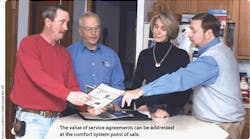What do you say when asked how many service agreements your company has? Has that number been reviewed? Is it accurate? Is the number of agreements growing, staying the same, or shrinking from year to year? How do you improve the numbers?
Why all these questions? It’s because the heart and soul of a company’s business are service agreements, and growing these agreements leads to growth of the company in service and sales. It’s therefore vital that the value of these agreements be firmly established on a continual basis — both externally and internally.
Investigate your entire maintenance program and procedures routinely to ensure that perceived and actual values are retained throughout all aspects of the maintenance agreement. Here are just a few examples of items that need periodic evaluation:
- The company’s and the customers’, understanding of the maintenance plans.
- The processes (sales and service) and consistency of such. This leads to evaluation of . . .
- Company training regarding service agreements
Understanding the Value
It’s vital that all staff members who will be selling service agreements to external customers understand the value of the plans. This requires the enthusiastic buy-in of all members of management and all other team members. If the internal team doesn’t understand what service maintenance agreements mean to the company (captive customer loyalty, guaranteed revenue, leads for equipment sales, and ongoing business in the off-season, etc.) or, if this isn’t reinforced to them on a continual basis, the company won’t be successful in selling maintenance plans. Make sure your internal staff is aware of the benefits to external customers, so they may transfer that information effectively.
Secondly, your external customers need to understand the value of the agreement to them. They must not only be aware of what the benefits of the plan are, but also understand why these benefits will save them time, money, hassle, etc., in order for them to embrace the value of the plan. If external customers don’t see the value in your maintenance plans, then it’s likely the company and the internal team hasn’t been consistent in messaging, or is not presenting the correct message when offering the program.
Addressing Objections
It’s important to address objections through an understanding of what value the customer is looking for. Encourage your staff to listen to customers — the key to selling customers service assurance plan might be within their objections, such as, “I can’t afford that much money right now.” An actively listening staff member, sensing that a greater perception of value might be obtained if the customer was able to pay for the agreement in small installments, might offer a monthly payment option at that time. After firmly establishing the plan’s value with the customer, he or she might be able to sell the agreement.
Processes and Consistency
Review all your company’s forms and documents relating to the service maintenance plans to verify that they effectively communicate value to customers. Track the changes made and analyze them to determine any improvement in sales. Audit phone calls (made through a calling service or by internal staff) to review what is being said, and re-tool or update scripted statements to improve the reflection of the service agreement’s value. Scrutinize your company’s brochures and literature (even those not directly related to the service maintenance agreement) to make sure they are conveying the value message.
Make sure presentations, forms and scripts connected to the service agreements are consistent in reflecting the established value. Everyone within the company should be saying the same thing about the agreements, in the same way, and verifying that the messaging is getting through to customers. From the very first phone conversation regarding service agreements to the last, everyone must focus on what to say and how to say it. Ensure that your staff are discussing the value of the service plan in terms that the customers wish to hear. Evaluate what your team is saying, collect feedback, and determine if the messaging is consistent and effective. And don’t hesitate to tap your internal resources: the person within the company selling the most service agreements may hold the key phrasing for successful selling.
Service Maintenance Agreement Training
It’s imperative that companies train through various methods (training from outside sources, videos, online webinars, etc.) since everyone learns differently. Train, train and retrain with scripting for CSR’s, service technicians, the sales team, receptionists and managers. Again, everyone and every training source should be saying the same thing for consistency and complete delivery.
Effective learning and communication can be achieved through scripting. Staff need to see the messaging in writing, and then have and opportunity to discuss the script, talk about what works and do simple role-playing. Practice makes perfect, so if staff members aren’t practicing the script verbally, they will likely stumble when talking to the customer about the service contract.
Why Value is Important
In exploring our company’s service master agreement numbers, we discovered that our numbers were fairly consistent from year to year. While it’s nice to not see those numbers going down, we were also perplexed as to why they failed to grow each year. When we closely evaluated why we weren’t growing our plan numbers, we learned some interesting things. For example, we found that many plans had been sold to first-time customers during a very hot time of year in our area. Customers had called in for demand service calls and merely needed someone (read: anyone) to come put the “fire” out for them and fix their air conditioning. When these customers were told that our service master agreement members receive priority service, they were eager to sign up, as most other companies were booked up for days or weeks out at the time, and temperatures outside were soaring.
At the time, we thought we had done well to boost our sales. In reality, we were not establishing any real value to the customer at all. They perceived the cost of the agreement as an extra fee they were paying to receive priority service. They were willing to pay this “fee” when their system was experiencing a failure. When we contacted these customers to renew for the next year, many of them barely remembered who we were, or that they had even signed up for a service agreement. They felt their system was working now, and they didn’t need us anymore. We completely failed to sell them on the value of the service agreement.
Our evaluation showed us that our process of signing customers up for a service maintenance plan — so that we could give them priority service (and a discount on the service call and repairs) —was not only costing us revenue, it was also giving us an illusion of growth. This illusion was dissolved after we evaluated the information. This was extremely eye-opening, and something we might have overlooked if we had failed to evaluate.
Use the Numbers Evaluate Results
Data is essential in evaluating the improved perception of the value of service agreements in communications, processes, and training. It’s necessary to track sales information as well as attempted improvements. Such information includes: how many service agreements did each team member sell? What area are the most agreements being sold in, and why? Are customers with agreements renewing annually? Why or why not? What kind of training improves the number of agreements sold? What effects do changes in messaging have on sales numbers?
Track training and see if improvements happen. It’s vital in making improvements ,and measuring the success of your service agreement sales — and your company.
Narissa Rampey is co-owner of Air Assurance Company, Broken Arrow, OK. Rampey was Contracting Business magazine’s 2007 HVACR Woman of the Year. She can be reached at 918/258-2665, or by e-mail at [email protected]. This article is based on “Selling the Value of Service Agreements,” which Narissa Rampey presented during HVAC Comfortech 2009, in Nashville, TN. HVAC Comfortech 2010 will be presented Sept. 22-24, in Baltimore, MD. Visit www.hvacrweek.com for additional information.









